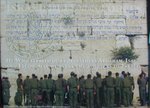Wahhabism and the Spread of Sunni Theofascism
by Ambassador Curtin Winsor, Jr.
Curtin Winsor, Jr. is a former US ambassador to Costa Rica (1983-1985.) He was Special Emissary to the Middle East at the outset of the Reagan administration. He is chairman and owner of the American Chemical Services Company of Marmet, WV and serves on the boards of several public policy organizations, including the William H. Donner Foundation, the Atlas Foundation for Economic Research, The Media Research Center and The Hudson Institute.
The United States has largely eliminated the infrastructure and operational leadership of Osama bin Laden's al-Qaeda terrorist network over the past five years. However, its ideological offspring continue to proliferate across the globe.
American efforts to combat this contagion are hamstrung by the fact that its ideological and financial epicenter is Saudi Arabia, where an ostensibly pro-Western royal family governs through a centuries-old alliance with the fanatical Wahhabi Islamic sect. In addition to indoctrinating its own citizens with this extremist creed, the Saudi government has lavishly financed the propagation of Wahhabism throughout the world, sweeping away moderate interpretations of Islam even within the borders of the United States itself.
The Bush administration has done little to halt this ideological onslaught beyond quietly (and unsuccessfully) urging the Saudi royal family to desist. This lack of resolve is rooted in American dependence on Saudi oil production, fears of instability in the kingdom, wishful thinking about democracy promotion as an antidote to religious extremism, and preoccupation with confronting Iran.
Background
Wahhabism is derived from the teachings of Muhammad ibn abd al-Wahhab, an eighteenth century religious zealot from the Arabian interior. Like most Sunni Islamic fundamentalist movements, the Wahhabis advocated the fusion of state power and religion through the reestablishment of the Caliphate, the form of government adopted by the Prophet Muhammad's successors during the age of Muslim expansion. What sets Wahhabism apart from other Sunni Islamist movements is its historical obsession with purging Sufis, Shiites, and other Muslims who do not conform to its twisted interpretation of Islamic scripture.
|
In return for endorsing the royal family's authority in political, security, and economic spheres after the establishment of the Kingdom of Saudi Arabia in 1932, Wahhabi clerics were granted control over state religious and educational institutions and allowed to enforce their rigid interpretation of sharia (Islamic law).
Wahhabism was largely confined to the Arabian peninsula until the 1960s, when the Saudi monarchy gave refuge to radical members of the Muslim Brotherhood fleeing persecution in Nasser's Egypt. A cross-fertilization of sorts occurred between the atavistic but isolated Wahhabi creed of the Saudi religious establishment and the Salafi jihadist teachings of Sayyid Qutb, who denounced secular Arab rulers as unbelievers and legitimate targets of holy war (jihad). "It was the synthesis of the twain-Wahhabi social and cultural conservatism, and Qutbist political radicalism- that produced the militant variety of Wahhabist political Islam that eventually (produced) al-Qaeda."[1]
The terms Islamofascism and theofascism have been frequently misused by Westerners to refer to virtually all forms of radical Islamism, but they are fitting appellations for Wahhabism today.[2] The sect's rejection of individual liberties, disparagement and reduction of women's rights and status,[3] disregard for the intrinsic value of human life, and encouragement of violence against unbelievers, are unparalleled among Islamic fundamentalist movements.
Former CIA Director R. James Woolsey has used the term "Sunni theocratic totalitarianism,"[4] a term that highlights both the movement's "will to power" over the most minute aspects of Muslim daily life and its global ambitions. He also notes that its adherents do not raise the banner of Islam in pursuit of specific national, political, or territorial gains. Al-Qaeda's second in command, Ayman al-Zawahiri has sharply rebuked the Palestinian Islamist group Hamas[5] and Egypt's Muslim Brotherhood for participating in national elections.[6]
During the 1970s, Wahhabi clerics encouraged the spread of this revolutionary and atavistic ideological synthesis into Saudi universities and mosques, because it was seen as a barrier to the threat of cultural Westernization and spread of corruption that accompanied the 1970s oil boom. Consequently, the royal family and their religious establishment looked for a cause with which to deflect the growing zealotry from Wahhabist theofascism, a danger highlighted by the seizure of the Grand Mosque at Mecca by heavily armed Islamic Studies students in 1979. The diversion that the royal family seized upon was the Soviet invasion of Afghanistan.
The Saudis financed a large-scale program of assistance to the Afghan mujahideen, in coordination with the Pakistan's Inter Service Intelligence agency (ISI) and the CIA, while funding radicalized madrassas to disseminate neo-Wahhabi ideology and literature in the sprawling Afghan refugee camps of Pakistan. They also dispatched thousands of volunteer jihadis from Saudi Arabia and other Arab countries to fight alongside the mujahideen.
These so-called "Arab Afghans" dispersed to far-flung areas of the world after the Soviet withdrawal from Afghanistan in 1988. They pursued further victories against "unbelievers" in the name of Islam, and they were accompanied by militant Wahhabi preachers. These elements would form the backbone of al-Qaeda. Al-Qaeda was initially headquartered in Sudan, but returned to Afghanistan in 1996, following the seizure of Kabul by the Taliban. This was a new Afghan force, recruited in Wahhabi madrassas and, trained by the Pakistanis. Its goal was the establishment of a model Wahhabi state in Afghanistan.
The Saudi royal family revoked bin Laden's Saudi citizenship (in response to heavy American pressure), but did little to interfere with Wahhabi "charities" in the Kingdom and abroad. These entities raised money for al-Qaeda, while the religious onslaught of Wahhabism continued to receive government sponsorship and funding. Osama bin Laden is widely believed to have reached an agreement with Prince Turki al-Faisal, then-chief of Saudi National Security and Intelligence in the mid 1990s, whereby al-Qaeda would not target the Kingdom, and the Kingdom would not interfere with al-Qaeda's fundraising or seek bin Laden's extradition.[7] In fact, Al-Qaeda abstained completely from attacks on Saudi targets within the Kingdom prior to 9/11.
Terrorist attacks and clashes between Saudi police and Islamist militants have erupted erupting periodically since May 2003, after the Saudi Government began cracking down on underground cells in the Kingdom (under pressure from Washington). However, it appears that most Al-Qaeda-affiliated terrorist groups still respect this quid pro quo Hundreds of members of the Saudi royal family jet around the world without fear of assassination. The country's vulnerable petroleum industry has only once been targeted by terrorists, and then in a less that serious manner. In return, and notwithstanding its limited cooperation with Washington in restricting terrorist financing, the Saudi monarchy has maintained its commitment to propagating Wahhabism at home and abroad, providing the terrorist underground with a growing flood of eager recruits.
Wahhabi Indoctrination
"Man . . . requires proper instruction and a fortunate nature, and then of all animals he becomes the most divine and most civilized; but if he be insufficiently or ill educated, he is the most savage of earthly creatures."
Plato
It is estimated that well over one-third of Saudi Arabia's public school curriculum is devoted to Wahhabi teachings. Passages from Saudi textbooks quoted in the American media after 9/11 generated much controversy. One textbook, for example, informed ninth grade students that Judgment Day will not come "until the Muslims fight the Jews and kill them," while another stated that it is "compulsory" for Muslims "to consider the infidels their enemy."[8] Embarrassed by the revelations, the Saudi government purported to launch a comprehensive review of its educational curricula and pledged that all such references would be removed. Last year, however, Freedom House published an exhaustive report on the new curriculum, concluding that it "continues to propagate an ideology of hate toward the 'unbeliever,' which include Christians, Jews, Shiites, Sufis, Sunni Muslims who do not follow Wahhabi doctrine, Hindus, atheists and others."[9]
Some analysts dismiss the relevance of this indoctrination on the grounds that "conforming to an ultra-conservative, anti-pluralistic faith does not necessarily make you a violent individual,"[10] but this reasoning is fallacious. If only one percent of the 5 million Saudi students exposed to these teachings resort to violence, this would produce 50,000 jihadis.[11] Not surprisingly, bin Laden himself denounced foreign interference in Saudi school curricula in an April 2006 audiotape.
Moreover, these teachings are reinforced by Wahhabi clerics in Saudi Arabia, who advocate jihad against enemies of "true" Islam - outside the kingdom." Incitement to violence against Shiites is particularly common. In December 2006, a high-ranking cleric close to the Saudi royal family, Abdul Rahman al-Barak, denounced Shiites as an "evil sect . . . more dangerous than Jews and Christians."[12]
In November of 2004, twenty-six clerics, most of whom held positions as lecturers of Islamic studies at various Saudi state-funded universities, issued a call for jihad against American forces in Iraq. Two Saudi officials denounced the fatwa in interviews with the Western media, but no retraction was made in Arabic to local media outlets. Months later, a Saudi dissident group released a videotape showing the Chief Justice of Saudi Arabia's Supreme Judicial Council, Saleh bin Muhammad al-Luhaidan, advising young Saudis at a government mosque on how to infiltrate Iraq and fight US troops, as well as assuring them that Saudi security forces would not punish them after their return.[13] While Luhaidan publicly retracted his statements, videotapes of prominent Saudi clerics exhorting the public to wage jihad in Iraq and elsewhere continue to surface.[14]
Exporting Hatred
While Saudi citizens remain the vanguard of Islamic theofascism around the world, the growth potential for this ideology lies outside the Kingdom. The Saudis have spent at least $87 billion propagating Wahhabism abroad during the past two decades,[15] and the scale of financing is believed to have increased in the past two years as oil prices have skyrocketed. The bulk of this funding goes to the construction and operating expenses of mosques, madrassas, and other religious institutions that preach Wahhabism. It also supports the training of imams; domination of mass media and publishing outlets; distribution of Wahhabi textbooks and other literature; and endowments to universities (in exchange for influence over the appointment of Islamic scholars). By comparison, the Communist Party of the USSR and its Comintern spent just over $7 billion propagating its ideology worldwide between 1921 and 1991.[16]
The lack of a formal ecclesiastical hierarchy within Sunni Islam renders traditional religious institutions weak in the face of well-funded Wahhabi missionary activities. Most Sunni Muslims look to their local imams for religious guidance. In poor countries, these imams and local leaders often find it difficult to resist the siren song of small amounts of Saudi aid that accompany Wahhabist missionaries in poor. Moderate imams do not have a comparable source of financial patronage with which to combat its spread.[17]
Important fronts in this campaign are in south and southeast Asia, where the majority of the world's Muslims live. In Pakistan, Indonesia, the Philippines, Malaysia and southern Thailand, Wahhabis have co-opted (or replaced) village and neighborhood imams, and there is a fresh stream of converts returning from stays as guest workers in Saudi Arabia. The children of poor converts are often taken to Saudi Arabia for "education" and many are returned as cannon fodder for use by Wahhabi terrorist fronts.[18] In India, efforts are underway to capture a portion that country's huge Muslim minority as well as the Untouchable Caste.
Wahhabism has made less headway in the former Soviet Republics of Central Asia, despite the fact that decades of Communist rule had weakened their traditional Islamic institutions. Several successor governments, especially the Uzbekis, have cracked down harshly on militant Islamist groups, while encouraging educational systems in the Hanafi tradition that promote tolerant and peaceful Islam. Africa is also a critical area of Wahhabi expansion, as it offers a multitude of "failed states" and communal cleavages ripe for exploitation, most notably in the Sudan and Nigeria.[19]
In all of these areas, the central dynamic is the same - it is the overwhelming wealth of Saudi Arabia that enables the Wahhabi sect to proselytize on a global scale, not the intrinsic appeal of its teachings. Throughout the world, moderates echo the assessment of Somali journalist Bashir Gothar, who writes that his country's tolerant Sufi-infused Islamic culture has been: "swept aside by a new brand of Islam that is being pushed down the throat of our people - Wahhabism. Anywhere one looks, one finds that alien, perverted version of Islam."[20]
Wahhabism in the West
Wahhabi proselytizing is not limited to the Islamic world. The Saudis have financed the growth of thousands of Wahhabi mosques, madrassas, and other religious institutions in Western countries that have fast-growing Muslim minorities during the past three decades.[21] Wahhabi penetration is deepest in the social welfare states of Western Europe, where chronically high unemployment has created large pools of able-bodied young Muslim men who have "become permanent wards of the state at the cost of their basic human dignity."[22] This is a perfect storm of alienation and idleness, ripe for terrorist recruitment. The perpetrators of the 2005 London subway attacks were native-born Britons of Pakistani descent, recruited locally and trained in the use of explosives during visits to Pakistan. The Dutch Moroccan who murdered Dutch filmmaker Theodor Van Gogh in 2004 (for producing a film critical of Islam) was also a product of Wahhabi indoctrination.
The Wahhabis have had less traction in the United States, which lacks the masses of unassimilated young people that exist in Europe. US welfare laws no longer allow able-bodied young men to have indefinite periods of government subsidized unemployment and immigrants (both Muslim and non-Muslim) tend to find a more stable niche in American society.
Nevertheless, Wahhabi penetration of US mainstream Islamic institutions is substantial. A 2005 Freedom House Report examined over 200 books and other publications distributed in 15 prominent Saudi-funded American mosques. One such publication, bearing the imprint of the Saudi embassy and distributed by the King Fahd Mosque in Los Angeles, contained the following injunctions for Muslims living in America:
Be dissociated from the infidels, hate them for their religion, leave them, never rely on them for support, do not admire them, and always oppose them in every way according to Islamic law.
[W]hoever helps unbelievers against Muslims, regardless of what type of support he lends to them, he is an unbeliever himself.
Never greet the Christian or Jew first. Never congratulate the infidel on his holiday. Never befriend an infidel unless it is to convert him. Never imitate the infidel. Never work for an infidel. Do not wear a graduation gown because this imitates the infidel.[23]
Although Saudi-funded religious institutions have been careful not to incite or explicitly endorse violence since 9/11, they unapologetically promote distrust toward non-Muslims and self-segregation. In effect, they are trying to reproduce in America the kind of social conditions that have fueled radicalization and terrorist recruitment in Europe.
Saudi-funded religious institutions, such as the American Muslim Council (AMC), have long been treated as representatives of the American Muslim community by the US government. Abdurahman Almoudi, the founder of the AMC, was a frequent visitor to White House under the Clinton and Bush administrations despite having publicly proclaimed support for the Palestinian terrorist group Hamas (he is now in jail for having illegally accepted hundreds of thousands of dollars from the Libyan government).
High level political access has enabled such groups to penetrate the American prison system. The US Bureau of Prisons has relied on chaplain endorsements from the so-called Graduate School of Islamic and Social Sciences (GSISS), a Saudi-funded organization.[24] The most egregious example of this penetration is the case of Imam Deen Umar, the Administrative Chaplain for the State of New York Department of Corrections. Umar, an American convert who made two visits to Saudi Arabia and studied at the GSISS, and the men he hired as chaplains, had exclusive access to the 13,000 Muslims in the New York prison system. According to then FBI Assistant Director for Counterterrorism John S. Pistole, Umar was found to have "denied prisoners access to mainstream imams and materials" and "sought to incite prisoners against America, preaching that the 9/11 hijackers should be remembered as martyrs and heroes."[25]
While there is little evidence that al-Qaeda has recruited inside the American prison system, it is noteworthy that José Padilla (arrested in 2002 in connection with an al-Qaeda plot to detonate a radioactive "dirty bomb" in the United States) first embraced radical Islam while in prison, as did Richard Reid (the so-called "shoe bomber" arrested in 2001) in the UK and Abu Musab al-Zarqawi in Jordan.
The American Muslim Armed Forces and Veterans Affairs Council (a branch of the AMC), along with the Saudi-funded Islamic Society of North America (ISNA), secured the right to select, train and certify all Muslim chaplains for the US Armed Forces.[26] It has been reported that Saudi Arabia provided more than 100 US Armed Forces personnel with free trips to Mecca as an opportunity to make their hajj.[27] Almoudi arranged for the Saudi-controlled Institute of Islamic and Arabic Sciences (IIAS) to train "American soldiers and civilians to provide spiritual guidance when paid Muslim chaplains aren't available." The Wall Street Journal also reported that there were signs that: "the schoolŠdisseminates the intolerant and anti-Western strain of Islam espoused by the [Saudi] Kingdom's religious establishment."[28]
While the Saudi ambassador in Washington said last year that his government was undertaking a "very intense review" of all missionary activities in the United States,[29] it is clear that the Saudis are concerned primarily with avoiding bad publicity, not abandoning their drive to dominate Islamic institutions in America.
Causes of American Inaction
The Bush administration has been reluctant to put serious pressure on the Saudis to stop propagating Wahhabism, despite the enormous threat to American security posed by Sunni theofascism. There are several reasons for this.
The first is American dependence on the kingdom's abundant oil reserves, which enable to the Saudis to maintain roughly 3 million b/d in spare production capacity. This spare capacity has been called the "energy equivalent of nuclear weapons," because it puts the Saudis in a unique position to compensate for disruptions in supplies from other producers and discourage price gouging - a service provided to the United States (and other industrialized nations) in exchange for protection.[30] However, the argument that a firm public stance against Saudi propagation of religious hatred might lead the kingdom to retaliate economically is spurious. Saudi Arabia's use of the oil weapon would alienate the entire industrialized world, while threatening the relative economic prosperity that preserves stability in the kingdom.
Some politicians and writers have voiced concern that pushing the Saudi royal family to curtail the Wahhabis could lead to terrorist attacks on the country's vulnerable petroleum infrastructure or lead to the collapse of the monarchy, which would produce an even worse outcome - a Saudi state controlled exclusively by religious fanatics. While these are serious risks, it must be borne in mind that most Wahhabi radicals view the monarchy (and its oil fields) as a golden goose. It is only by disguising Saudi Arabia as a 'friendly nation' that they have been able to go as far as they have in spreading their atavistic perversion of Islam.
Such concerns reveal a tendency to imagine or spin the Saudi royal family as fundamentally pro-Western. Prince Bandar bin Sultan, who served as ambassador to the United States from 1983 to 2005, has played an important role in masking Saudi - Wahhabi realities. His personal charm, Washington Post journalist David Ignatius writes, "many American leaders and even presidents to forget that he represented a secretive, repressive Muslim kingdom that survived because it had made a pact with 'puritanical' Wahhabi clerics who despised America."[31]
Bandar was also instrumental in the growth of what Daniel Pipes has called a "culture of corruption" that renders the executive branch of the American government "incapable of dealing with the Kingdom of Saudi Arabia in the farsighted and disinterested manner that US foreign policy requires." Pipes points to a "revolving door syndrome" afflicting senior diplomats and policymakers who deal with the Saudis in their official capacities.[32] Very often, they have enjoyed lucrative post-government careers working as consultants for Saudi businessmen and companies, or running Saudi-financed nongovernmental organizations. "If the reputation then builds that the Saudis take care of friends when they leave office," Bandar once reportedly told a close associate: "you'd be surprised how much better friends you have who are just coming into office."[33]
Unable or unwilling to combat the spread of Sunni theofascism at its main source (Saudi Arabia), the Bush administration launched a democracy promotion campaign intended to eradicate political conditions receptive to its global spread. However, rather than building stable and less oppressive systems resistant to religious extremism in Afghanistan and Iraq, the accumulating shortfalls of American intervention in both countries have made them magnets for jihadist recruitment.
The Question of Iran
The Bush Administration's reluctance to challenge the Saudis after 9/11 initially encountered impassioned objections from conservative and liberal commentators alike, but the outrage has tapered off as attention has became increasingly focused on Shiite Iran and its nuclear weapons program. In the view of the administration, the Iranian threat to American national security not only supercedes the threat of Sunni theofascism, but supercedes it to such a degree that a more accommodating policy toward Saudi Arabia is warranted. However, while the prospect of militant Shiite clerics in possession of nuclear weapons is understandably disconcerting to many Americans, the Iranian threat is mitigated by several important factors.
For all of the shrill and unsettling words of Iranian President Mahmoud Ahmadinejad, his government's foreign policy is driven more by Iranian nationalism than Shiite Islamism (this is evident, for example, in Tehran's support for the predominantly Christian nation of Armenia in its dispute with Shiite Azerbaijan). This is not surprising, as Iran (known as Persia prior to the twentieth century) has existed in one form or another since biblical times, while it embraced Shiite Islam just 500 years ago. While Ahmadinejad exploits Iranian nationalism to win public support in his confrontation with the West, it can easily turn against him if he were to embark on a global adventure. Wahhabi clerics may support the Saudi royal family as a necessary evil in order to protect their global proselytizing mission, but they recognize no Saudi Arabian "nation" whose interests take precedence over their agenda. Such is not the case in Iran.
Furthermore, Shiite Islamism does not exhibit theofascist tendencies. Radical clerics in Iran have been responsible for horrendous abuses of power, but they do not regard non-Shiite Muslims as "unbelievers" who must be systematically purged - and even if they did, the fact that Shiites comprise only 10-15% of the world's Muslims would make such a project impractical. Even within the Shiite world, there is no prospect of a Wahhabi-style Iranian takeover of religious discourse because unlike the Sunnis, Shiite Islam is rigidly hierarchical. Iraqi and Lebanese Shiites gladly accept Iranian financial and military support, but they are fiercely loyal to their own clerical establishments.
An even greater fallacy is the widespread belief in Washington that a strong relationship with Saudi Arabia is an asset in confronting Iran. On the contrary, coddling the Saudis makes it more difficult for the United States to deal with Iran. The Bush administration's refusal to hold Saudi leaders accountable for their incitement of Wahhabi jihadists (who have murdered far more Shiites than Americans, mostly in Iraq and Pakistan) is a source of deep resentment in the Shiite world. It is no surprise that the only two major public demonstrations against Al-Qaeda in the Islamic world after the 9/11 attacks were both organized by Shiites (in Tehran and Karachi, Pakistan).
It is interesting to note that the recent escalation of US - Iranian tensions has made the Saudis less accommodating about Iraq than ever before. Reports that the Saudi Government is threatening to openly fund and arm Sunni insurgent groups if American forces withdraw from Iraq are a case in point.[34] In effect, the Saudis are signaling to the Bush administration that they will thwart any American plan to cede control of Iraq to its Shiite-dominated, democratically-elected government, while signaling to the Sunni insurgents in Iraq that they can reject American efforts to broker a political settlement and not be left to face the consequences alone.
Iran has no history of direct aggression against its neighbors, and unlike Saddam's Sunni-dominated Iraq, they have never used weapons of mass destruction during invasions of neighbors or against their own people. The strongest argument for this approach lies with the extent that Iran craves recognition of its actual status as the historically authentic nation state in the Middle East. Iran has long aspired to be and probably will be the region's predominant Islamic regional power.
The Road Ahead
Washington will eventually have to face the reality that derailing Iran's pursuit of nuclear weapons (and, more broadly, its emergence as the predominant Islamic regional power) may be impossible over the long-term, and possible in the short term only at the expense of fatally undermining efforts to contain the spread of Sunni theofascism. The United States would do better to find a mutually acceptable means of working with this reality, rather sustaining a deadlocked confrontation by conditioning its willingness to normalize relations with Tehran on the abandonment of its nuclear aspirations. US - Iranian engagement will greatly enhance American leverage over the Saudis, as well as check the threat of Sunni theofascist terrorism in Iraq and, to a lesser extent, Afghanistan. Saudi officials have urged the Bush administration not to talk with Iran because they know that a reduction in US - Iranian tensions will draw more attention to their unbridled export of Wahhabism.
Reducing American dependence on Saudi oil must also be part of any comprehensive strategy for addressing the threat of Sunni theofascism. Although President Bush has expressed commitment to developing alternative energy sources, the surplus production capacity of the Saudis enables them to lower prices as necessary to ensure that this will not be cost effective for a long time. Barring radical breakthroughs in fuel technologies, an optimistic forecast would have bio fuels (ethanol, synthetic diesel and bio oil) making up to 30% of US petroleum equivalent needs by 2030.[35] For the short to medium term future, only conservation can significantly alter American petroleum dependency.
In addition, countering the theofascist threat will require the same kind of comprehensive strategy used to combat the spread of Communism during the twentieth century. While the First Amendment undoubtedly protects the right of individuals to inveigh against pluralism, individual freedoms, and other Western norms, there is nothing in the constitution that protects the right of foreign governments or nationals to disseminate this message on American soil. As for the rest of the world, poor Muslim countries (many of them dependent on Saudi economic aid or remittances from workers in the Arab Gulf) cannot be expected to demand that Riyadh rein in Wahhabi missionaries - they are looking to Washington to apply pressure.
Without the billions of dollars in Saudi funds, the ideological, political, and psychological edifice of Wahhabi theofascism will begin to crumble, particularly if a concerted effort is made by the Bush administration to promote moderate Islamic institutions (a recent study by the RAND Corporation offers some insightful recommendations).[36] Ultimately, the devil is not in the details - it is the administration's broad lack of resolve in confronting the threat of theofascism, not the lack of viable methods of combating it, that imperils American security.
Notes
[1] See Mohammed Ayoob, "Political Islam: Image and Reality," World Policy Journal, Vol. 11, No. 3, Fall 2004.
[2] Fascism is "a form of political behavior marked by obsessive preoccupation with community decline, humiliation, or victim-hood and by compensatory cults of unity, energy, and purity, in which a mass-based party of committed nationalist militants, working in uneasy but effective collaboration with traditional elites, abandons democratic liberties and pursues with redemptive violence and without ethical or legal restraints goals of internal cleansing and external expansion." See Robert Paxton, The Anatomy of Fascism (New York: Alfred A. Knopf, 2004), p. 218.
[3] Saudi police 'stopped' fire rescue, BBC, 15 March 2002. Wahhabi religious police (mutaween) prevented Saudi schoolgirls from fleeing a burning school because they were not properly veiled, leaving fifteen of them to die inside in 2002, an outrage equaled only by the Taliban's rein of terror against women in Afghanistan.
[4] R. James Woolsey, "The Elephant in The Middle East Living Room: Watching Wahhabis," The National Review, 14 December 2005.
[5] Zawahiri declared in a December 2006 videotape, "How could they not demand an Islamic constitution before entering these elections? Are they not an Islamic movement?" See: "Al Qaeda Warns U.S. on Fighting in Muslim Lands," The New York Times, 21 December 2006.
[6] Zawahiri accused it of being "duped, provoked and used" by the United States after it participated in the 2005 legislative elections. See "Al-Qaida's No. 2 leader praises U.S. hints of troop reduction in Iraq," The Associated Press, 6 January 2006.
[7] In his 2003 book, Why America Slept, Gerald Posner cites two unidentified senior Bush administration officials as saying that captured Al-Qaeda leader Abu Zubaydah revealed details of a Saudi-Pakistani-Bin Laden triangle. See Gerald Posner, Why America Slept: The Failure to Prevent 9/11, (New York: Random House, 2003).
[8] "Inside the Kingdom," Time, 7 September 2003.
[9] Nina Shea, Saudi Arabia's Curriculum of Intolerance, Freedom House, 2006.
[10] John Esposito, quoted in Gary Leupp, On Terrorism, Methodism, Saudi 'Wahhabism' and the Censored 9-11 Report, Counterpunch, 8 August 2003.
[11] Ali al-Ahmed of the Washington Institute for Gulf Affairs makes this point. See Saudi Arabia's Curriculum of Intolerance, CBN.org, 14 June 2006.
[12] "Top Saudi cleric issues religious edict declaring Shiites to be infidels," Associated Press, 29 December 2006.
[13] More Evidence of Saudi Double Talk?, MSNBC, 26 April 2005.
[14] In an April 2006 lecture, Saudi cleric Nasser bin Suleiman al-Omar cautioned his audience not to "get involved in things that are not jihad . . . [and] divert the strife and calamity into the lands of the Muslims, instead of aiming them directly at the enemies." He continued, saying that: "there are places where jihad is proper - in Afghanistan, Palestine, Iraq, Chechnya, Kashmir, and the Philippines." See Saudi Cleric Nasser bin Suleiman Al-'Omar: 'America is Now Disappearing From the Hearts Within America Itself . . . MEMRI Special Dispatch #1154, 4 May 2006.
[15] Alex Alexiev, "Terrorism: Growing Wahhabi Influence in the United States", Testimony before the US Senate Committee on the Judiciary, Subcommittee on Terrorism, Technology and Homeland Security, 26 June 2003.
[16] Author interview with Evgueni Novokov, Op. Cit.
[17] Author interview with Abdel Guzman, Grand Imam of Jolo, Jolo City, Sulu Province, The Philippines, 5 March 2004.
[18] Author's interview with Abdel Guzman, The Grand Imam of Jolo, Op. Cit.
[19] See Freedom House, The Talibanization of Nigeria: Radical Islam, Extremist Sharia Law, and Religious Freedom, March 2002.
[20] "Against the Saudization of Somaliland," Addis Tribune (Ethiopia), 21 November 2003. http://www.addistribune.com/Archives/2003/11/21-11-03/Against.htm
[21] In March 2002, the official Saudi magazine Ain al-Yaqeen estimated that the Saudi royal family in countries where Muslims were a minority has funded 210 Islamic centers, 1,500 mosques, 202 colleges, and 2,000 madrassas. The number of all Saudi Government and charitably funded institutions beyond Saudi Arabia is much higher. Cited in "Inside the Kingdom," Time, 7 September 2003.
[22] Alex Alexiev, "France at the Brink", The San Diego Union Tribune, 20 November 2005. See also: Alex Alexiev, Europe's Islamist Future is Now, The Center for Security Policy, 13 June 2005.
[23] Other publications examined include textbooks from the Saudi Ministry of Education and collections of religious edicts by state-sanctioned clerics in the kingdom. See Freedom House, Saudi Publications on Hate Ideology Fill American Mosques, January 2005.
[24] Daveed Gartenstein-Ross, "Wahhabism in the Big House: The Teaching of Jihad in American Penitentiaries," The Weekly Standard, 26 September 2005.
[25] "Terrorist Recruitment in Prisons and The Recent Arrests Related to Guantanamo Bay Detainees," Testimony of John S. Pistole, Assistant Director, Counterterrorism Division, FBI, before the Senate Judiciary Committee, Subcommittee on Terrorism, Technology, and Homeland Security, 14 October 2003.
[26] Testimony of Dr. J. Michael Waller before the US Senate Judiciary Committee's Terrorism Subcommittee, 14 October 2003.
[27] Frank Gaffney, A Troubling Influence, Front Page Magazine.com, 9 December 2003.
[28] Glenn Simpson, "Suspect Lessons: A Muslim School Used by Military Has Troubling Ties," The Wall Street Journal, 3 December 2003.
[29] "For Conservative Muslims, Goal of Isolation a Challenge; 9/11 Put Strict Adherents on the Defensive," The Washington Post, 5 September 2006.
[30] Edward L. Morse and James Richard, "The Battle for Energy Dominance," Foreign Affairs, March/April 2002.
[31] David Ignatius, "The Operator," The Washington Post, 5 November 2006, p.7.
[32] Daniel Pipes, "The Scandal of U.S.-Saudi Relations," The National Interest, Winter 2002/2003.
[33] "Oil for Security Fueled Close Ties; But Major Differences Led to Tensions," The Washington Post, 11 February 2002.
[34] In November 2006, Nawaf Obaid, a close advisor to Prince Turki, warned in a Washington Post op-ed that a phased American withdrawal from Iraq will result in "massive Saudi intervention," with options including "funding, arms and logistical support" to Sunni insurgents. "As the economic powerhouse of the Middle East, the birthplace of Islam and the de facto leader of the world's Sunni community (which comprises 85 percent of all Muslims), Saudi Arabia has both the means and the religious responsibility to intervene." See Nawaf Obaid, "Stepping Into Iraq: Saudi Arabia Will Protect Sunnis if the U.S. Leaves," The Washington Post, 29 November 2006.
[35] Outlook on Renewable Energy in America, Volume II: Joint Summary Report, American Council on Renewable Energy (ACORE), March 2007.
[36] The Rand Corporation, Building Moderate Muslim Networks, 2007.

































 While doing IDF (Israel Defence Forces) reserve duty on a mountain overlooking the
While doing IDF (Israel Defence Forces) reserve duty on a mountain overlooking the 





No comments:
Post a Comment